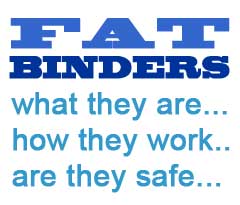 Weight management supplements can generally be grouped into one or more common categories:
Weight management supplements can generally be grouped into one or more common categories:
- Appetite suppressants
- Fat burners
- Carb blockers
- Fat binders (fat blockers)
Each category offers certain advantages and some forms of supplement may prove to be more suitable for certain users. Fat binders can be a particularly valuable dietary aid for anyone whose main dieting let-down is the amount of fat their diet contains. Why? Because fat binders limit the amount of fat the body is able to digest.
The Food Fat-Body Fat Relationship
The main problem with fat is it contains a high amount of calories. That means people who have too much fat in their diets can quickly meet their daily calorie requirements and as soon as that happens any extra calories consumed are then converted to body fat. Once this is understood it is easy to understand how a love of fast food and fatty foods can quickly lead to bulging guts, sagging bottoms, and unsightly bingo-wings.
| 1g fat = 9 calories | 1g carbohydrate = 4 – 5 calories | 1g protein = 4 -5 calories |
 Unfortunately some people find it hard to lower their fat intake, either due to lifestyle restrictions or ignorance of which foods hoard large amounts of hidden fat. Whenever this is the case a good fat binder can help limit the damage and put the user on the road to weight loss success, but the use of fat binders is not restricted to burger junkies and chip-aholics.
Unfortunately some people find it hard to lower their fat intake, either due to lifestyle restrictions or ignorance of which foods hoard large amounts of hidden fat. Whenever this is the case a good fat binder can help limit the damage and put the user on the road to weight loss success, but the use of fat binders is not restricted to burger junkies and chip-aholics.
A typical fat binder can lower the fat intake by around 30%. That could mean only 6 calories may be absorbed from each gram of fat instead of 9. A reduction like that offers obvious benefits and some fat binders can bind up to 50% of ingested fat.
How Fat Binders Work
Content
Fat binders are usually taken three times a day, up to 30 minutes before the three largest meals. This gives the fat binder time to line the stomach and form a protective layer. When the meal enters the stomach all the nutrients are digested and put to use in the normal fashion, but the fat is attracted to the fat binder and is bound to it.
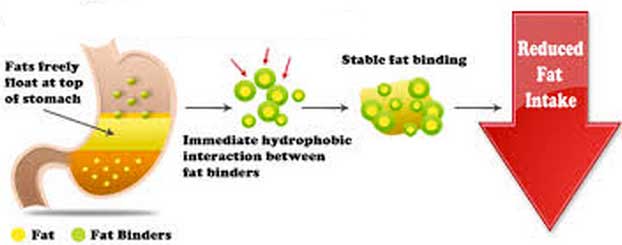
Fat binders are made from ingredients the body is unable to digest so they pass through the body untouched. The bound fat cannot be digested either so it is carried through the body along with its captor and finally exits the body with the stool.
Which Fat Binder is Best?
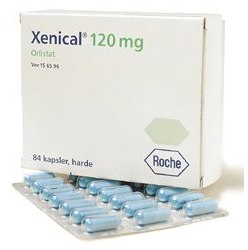 The prescription-only drug Xenical is renowned for its fat binding abilities, but most people will find it difficult to coerce their doctor into writing a prescription because it is usually considered a last resort option and tends to be reserved for the seriously obese. This may sound like bad news, but that is far from being the truth. Xenical has been around for quite a while and may in some ways be resting on its laurels. Many modern fat binding products can prove to be equally effective, and it could be argued some of them may provide superior results with less likelihood of side effects. None of them are addictive—the same cannot be said about Xenical.
The prescription-only drug Xenical is renowned for its fat binding abilities, but most people will find it difficult to coerce their doctor into writing a prescription because it is usually considered a last resort option and tends to be reserved for the seriously obese. This may sound like bad news, but that is far from being the truth. Xenical has been around for quite a while and may in some ways be resting on its laurels. Many modern fat binding products can prove to be equally effective, and it could be argued some of them may provide superior results with less likelihood of side effects. None of them are addictive—the same cannot be said about Xenical.
Anyone who conducts an internet search or visits their local pharmacy and has a word with the pharmacist will quickly discover several fat binder choices are available and a quick examination of the product information will probably reveal many of them share the same main ingredients.
The two most common fat binding ingredients are prickly pear (opunita ficus incida) and chitosan.
Prickly pear is a soluble fiber extracted from a plant. It has the proven ability to trap fat molecules and make them too large to be digested. After one test, conducted in 2009, the researchers noted prickly pear ‘significantly increased fecal fat excretion, helped reduce BMI and increased feeling of satiety.’
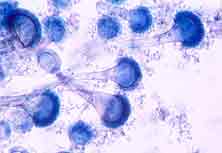 Chitosan is usually made from the shells of crabs, lobsters, shrimp, and other sea-living crustaceans. It is believed to possess good fat binding abilities, but further study is required and, by its very nature, the ingredient may not be suitable for dieters who have sea food allergies. More recently an alternative form of chitosan has become available, manufactured from the fungus aspergillus niger.
Chitosan is usually made from the shells of crabs, lobsters, shrimp, and other sea-living crustaceans. It is believed to possess good fat binding abilities, but further study is required and, by its very nature, the ingredient may not be suitable for dieters who have sea food allergies. More recently an alternative form of chitosan has become available, manufactured from the fungus aspergillus niger.
Tests show it can outperform other fat binding ingredients by 33% and it is also hypoallergenic so everything indicates this is the superior version.
How to Choose a Fat Binder
- Good fat binding products should not contain any filler ingredients that may dilute the main ingredient(s) power or present the possibility of side effects.
- Customer feedback and reviews should be good (where available).
- Products should be scientifically proven or, at the least, contain scientifically proven ingredients or ingredients that have a good reputation for producing fat binding results.
- Products should be manufactured by a reputable company and contain only natural ingredients.
Our Recommended Fat Binder
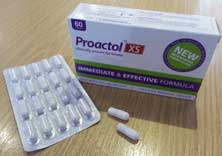 We rate Proactol XS as our preferred fat binder. Proactol XS has been in existence since 2008 and has evolved into one of the best known and most widely sold commercial brands.
We rate Proactol XS as our preferred fat binder. Proactol XS has been in existence since 2008 and has evolved into one of the best known and most widely sold commercial brands.
Starting from Proactol to Proactol Plus to now Proactol XS …

Be the first to comment